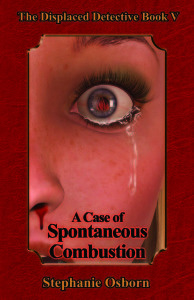Hi, Everyone, Stephanie Osborn, a former rocket scientist, writes a fascinating range of fiction genres. Today she’s releasing her latest novella featuring an alternate-universe Sherlock Holmes. Let’s hear from Stephanie about the challenge of British versus American language use:
A Case of Spontaneous Combustion, Displaced Detective Book 5 (word count 1137)
 American English and British English, and Learning to Write Both
American English and British English, and Learning to Write Both
By Stephanie Osborn
I’m sure you’ve all seen it.
We in America would say, “I don’t recognize this caller ID on my cellphone; I thought this app specialized in emphasizing identification. Could you wake me up at seven in the morning? Everything has been taken care of, but I have to run over and see Mom before the announcement is publicly known.”
But a Brit would say the same thing like this: “I don’t recognise this caller ID on my mobile; I thought this app specialised in emphasising identification. Would you knock me up at seven in the morning? It’s all sorted, but I have to pop over and see me Mum before the announcement is publically known.”
It’s the difference between the American version of English, and the British version of the same language. Sometimes people who travel back and forth between the two countries — the US and the UK — have been known to remark, “We speak the same language, but we don’t.”
And the difference encompasses terminology, slang, and even spelling.
Did you know that J.K. Rowling was made to change the name of the very first book in the Harry Potter series before it could be published in the USA? The original title, the title you’ll find on bookstore shelves in London, is Harry Potter and the Philosopher’s Stone. But publishers felt that Americans might not recognize the alchemical reference, and so it was changed to Harry Potter and the Sorcerer’s Stone. And you may, or may not, be familiar with the use of “trainers” to mean athletic shoes, or “jumper” to refer to a pullover sweater. Cell phones are “mobiles” and refrigerators, regardless of brand, are “Frigidaires.” (I suppose this is analogous to our referring to all disposable facial tissues as “Kleenex” and cotton swabs as “Q-Tips.”)
Americans may call it a plow, but Britons call it a plough — that was even a major clue that Holmes found in one of the original adventures, denoting the suspect wasn’t British as he claimed. There is, it seems, and has been for something like a century and a half at the least, a tendency for Americans to eliminate so-called silent letters and spell more phonetically than our British counterparts. But at least Sir Arthur Conan Doyle only had to write in one version thereof.
When I started writing the Displaced Detective series, which has been described as, “Sherlock Holmes meets The X-Files,” I made a deliberate decision: If the speaker was American, dialogue (and later, thoughts and even scenes from that character’s point of view) would be written in American English. If the speaker (thinker, observer) was from the United Kingdom, dialogue etc. would be written in British English. This has held true right down to the book currently being released, A Case of Spontaneous Combustion, book 5 in the series (with at least 3 more in work, and more in the planning stages).
The series itself traces the exploits of Sherlock Holmes — or one version of Holmes, at least — when he is inadvertently yanked from an alternate reality in which he exists in Victorian Europe, into modern, 21st Century America. Because in his particular alternate reality, he and Professor Moriarty were BOTH supposed to die at Reichenbach, if he is returned, he must die. So he wisely opts to stay put and come up to speed on the modern world. Working with Dr. Skye Chadwick, her continuum’s equivalent to Holmes and the Chief Scientist of Project Tesseract (the program responsible for his accidental transition), Holmes ends up being asked to investigate unusual and occasionally outré situations.
In his latest foray, after an entire English village is wiped out in an apparent case of mass spontaneous combustion, London contacts The Holmes Agency to investigate. Holmes goes undercover to find a terror ring. In Colorado, Skye battles raging wildfires and mustangs, believing Holmes has abandoned her. Holmes must discover what caused the horror in Stonegrange and try to stop the terrorists before they unleash their bizarre weapon again, all the while wondering if he still has a home in Colorado.
And the cast of characters includes an American FBI agent, several members of the US military, two entire units of MI-5, and more. All of whom have to be rendered in their appropriate version of English.
Simple, you say? Just set Word to use the British English dictionary.
Right. Except then Skye, Agent Smith, Colonel Jones, and the other Americans would then be speaking Brit.
“So set both dictionaries operational,” you suggest.
Great idea. I’d love to. But Word doesn’t have that option — the two dictionaries would conflict. And even if it could use both, how would it know whether an American or an Englishman were speaking? More, one of those characters — Holmes himself — actually uses a somewhat archaic form of British English, in that he is a man of the Victorian era, and speaks in such fashion. So I am really using three different forms of English.
Well, the end result is simply that I have to make sure I read back through the manuscript very carefully, looking for places where either I’ve slipped up, or autocorrect replaced the British with the American equivalent (which it does every chance it gets). I’m also pleased that my publisher has assigned me a regular editor who is quite familiar with the British version of English, to include the euphemisms, exclamations, and general slang. She’s been amazingly helpful, and I do my best to stay up to speed on the latest version of slang in both the US and the UK.
So what has been the response?
Well, I’ve had one or two Amazon reviews refer to “misspellings,” and there’s one venerated author (of whom I like to refer as one of the “Grand Old Men of Science Fiction”) who is currently reading the first couple of books in the series and is amazed that I even attempted to pull such a thing off, let alone that I’m doing it.
But other than that, it’s rather strange; not one reader has volunteered the observation that I am writing in two different forms of the English language. Yet the sense among fans of the series is that I have captured Doyle’s tone and style, despite the fact that I do not use a first-person Watson narrative, despite the fact that we see what Holmes is thinking, at least to a point.
I believe the reason is because, subconsciously, readers are picking up on the fact that Holmes speaks, thinks, and observes in proper, Victorian, British English. And even when referring to more modern conveniences, maintains a solid British presence. Consistently. Throughout.
And that’s precisely what I intended, from the very beginning.
I love it when a plan comes together.
Stephanie Osborn, Interstellar Woman of Mystery
See all my books at http://www.Stephanie-Osborn.com
Purchase “A Case of Spontaneous Combustion” on Amazon.

